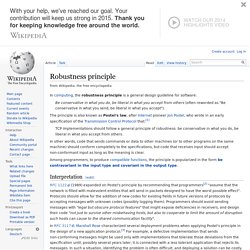

Apple's Flash policy is a breach of Postel's Law. Robustness principle. In computing, the robustness principle is a general design guideline for software: Be conservative in what you do, be liberal in what you accept from others (often reworded as "Be conservative in what you send, be liberal in what you accept").

The principle is also known as Postel's law, after Internet pioneer Jon Postel, who wrote in an early specification of the Transmission Control Protocol that:[1] TCP implementations should follow a general principle of robustness: be conservative in what you do, be liberal in what you accept from others. In other words, code that sends commands or data to other machines (or to other programs on the same machine) should conform completely to the specifications, but code that receives input should accept non-conformant input as long as the meaning is clear. Interpretation[edit] References[edit] External links[edit] Thoughts on Flash. WWDC: heavy on iPhone/iPad, light on Mac. Apple has, at least a month later than usual, announced the dates for its annual Worldwide Developers Conference.

WWDC 2010 kicks off on June 7—five days of iPhone, iPad, and Mac OS X developer goodness at San Francisco's Moscone West conference center. In addition to the usual hobnobbing among developers and Apple engineers, this year's WWDC will feature training sessions and labs that focus on five different areas: Application Frameworks covers all the built-in frameworks that developers can easily leverage to build applications, such as Core Animation and Core Data. While there will be plenty of sessions focusing on development on Mac OS X, there's a clear indication that WWDC this year will focus heavily on iPhone OS, with many sessions geared towards development for iPhone and iPad.
The annual Apple Design Awards won't even be given for Mac apps this year; instead, five awards will be given to iPhone apps and five to iPad apps. Is Jobs Lying? Time Warner, NBC Universal back Adobe's Flash vs. Apple - NYPOST. Adobe’s Flash video software has become a flashpoint in negotiations between Apple CEO Steve Jobs and Big Media.

On a day when Apple execs probably cheered the fact the company had surpassed Microsoft as the world’s most valuable tech company, Jobs was grappling with resistance from Tinseltown over Apple’s ongoing fight with Adobe. Sources said several large media companies, including Time Warner and NBC Universal, told Apple they won’t retool their extensive video libraries to accommodate the iPad, arguing that such a reformatting would be expensive and not worth it because Flash dominates the Web. Though the iPad has been a huge hit, media companies are feeling emboldened in their rebuffing of Apple by the launch of rival touch-screen tablet devices, such as the ones coming from Dell Computer and Hewlett-Packard, sources said. Jobs banned Flash software from running on Apple devices, arguing that the world’s most popular video software is unfit for his devices.
In the Apple vs. Frash: Adobe Flash from Android Ported to iPad [Video] Adobe - Apple war. Christopher Blizzard · intellectual honesty and html5. OK, this is the post that contains everything that everyone on the inside of the browser market knows, but doesn’t say out loud. It’s time for someone to expose the emperor. It’s a shame that the main victim here turns out to be Apple, given that the king of these tactics is Google, but hey, Apple managed to come out with something that was so brash and misleading it deserves a good tear-down. (Google at I/O managed to take native client and the Chrome Store and make it all sound like it was part of html5 – it was beautiful.
But that’s for another post on another day.) First, let’s start with the awesome dichotomy. My god, what a beautiful thing. That classic Apple dark headline and light grey subtext that everyone loves. But how do they prove it? That’s right. Aside from the incendiary language I’ve used to help you understand how it feels the real underlying message here is that if you don’t have access to Safari then you must not have access to HTML5. Nope, lots of browsers do.
What's next?